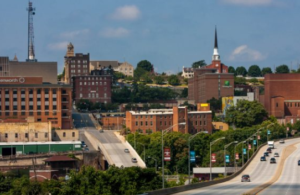Liberty University President Jerry Falwell Jr. said yesterday he supports changing the name of the city of Lynchburg because of its embarrassing association with the word “lynch.” He said the perceived racist connotations were an “embarrassment to Liberty University ever since we started,” reports Virginia Business magazine.
Falwell is not alone. Two weeks ago, Lynchburg resident Daisy Howard posted a petition on Change.org calling for a name change. The petition, addressed to Lynchburg City Council, has gathered more than 5,300 signatures. “I cringe having to say the name Lynchburg because ‘lynch’ is in the name,” said Howard in the petition. “The name of a city should not have such violent, racist and horrifying connotations.”
How insane is this?
Lynchburg was named after its Quaker John Lynch, who freed his slaves during his lifetime and supported the antislavery movement. One would think city residents would be proud to be associated with a guy like that.
According to Wikipedia, the term “lynch” probably originated from Charles Lynch who, as coincidence would have it, was a Virginia Quaker also. An American Revolutionary who headed a county court in Virginia, he imprisoned Loyalist supporters of the British for up to a year during the war without proper jurisdiction. A debate subsequently ensued over the propriety of his actions, and the term “Lynch law” took on the meaning of assuming extrajudicial authority. Lynch was not accused of racism — he acquitted blacks accused or murder on three separate occasions. (On the other hand, he was accused of ethnic prejudice against Welsh miners.)
In the early years of the Republic, the practice of lynching as we now think of it — mobs abducting someone suspected of a crime and hanging them without trial — was not applied against blacks only. From 1882 to 1985, for example, 411 whites were lynched compared to 227 blacks. In my own researches for a book I’m working on, I discovered to my surprise that most lynching victims in turn-of-the-century West Virginia were white. The practice was most common when the governmental apparatus of law-enforcement was weak and undeveloped. But with the rise of the Ku Klux Klan and the institutionalization of Jim Crow laws in the South, lynching victims were overwhelmingly black. The lynching of whites nearly died out by 1900 just as the extra-judicial killings against blacks was peaking. By the 20th century, lynchings had become a weapon to enforce white supremacy.
The practice of lynching is abhorred for good reason, and its use as a tool of racial dominance is a stain on U.S. history. If the city of Lynchburg had been named after a man who practiced or apologized for race-based lynching, then I would agree, by all means change the city’s name.
But by almost any definition, John Lynch was one of the good guys. Following the dictates of his conscience, he freed his slaves. He supported abolition. City residents should be proud of their founder and proud of their name. Their motto should read, “Our city is named after the other Lynch — the good one.”
A side note: Fewer African-Americans were lynched in Virginia than any other Southern state in the 20th century — a “dubious distinction,” notes Encyclopedia Virginia. The Old Dominion also was the first state in the country to enact a law, in 1928, to make lynching a state crime. The law was passed, some historians say, because the leaders of the manufacturing-oriented “New South” saw it as bad for business.



